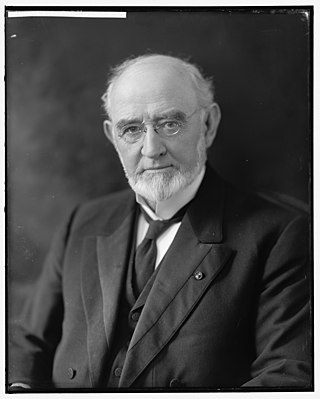Related Research Articles

William Alfred Quayle was an American Bishop of the Methodist Episcopal Church, elected in 1908.
Charles Wesley Brashares (1891–1982) was an American bishop of The Methodist Church and the United Methodist Church, elected in 1944.
Eben Samuel Johnson was an English-American bishop of the Methodist Episcopal Church, elected in 1916.

Earl Cranston was an American bishop of the Methodist Episcopal Church, elected in 1896. He also distinguished himself as a Methodist pastor and presiding elder, and as an editor and publisher of the M.E. Church.
Paul Elliott Martin was an American bishop of the Methodist Church and the United Methodist Church, elected in 1944. He also distinguished himself as a Methodist pastor and district superintendent, as well as by notable service to his denomination.
Costen Jordan Harrell was a bishop of The Methodist Church in the United States, elected in 1944.
John Edward Robinson was a missionary bishop of the Methodist Episcopal Church, elected in 1904.
Clare Purcell was an American bishop of the Methodist Episcopal Church, South and the Methodist Church, elected in 1938.
John Louis Nuelsen was a German-American Bishop of the Methodist Episcopal Church and The Methodist Church, elected in 1908. He also distinguished himself as a Methodist pastor, as a college and seminary professor and theologian, and as an author and editor.
Robert Eric Hayes Jr. is a member and serves as Bishop Emeritus of the Global Methodist Church. At its May 22, 2023, weekly meeting, The Global Methodist Church's Transitional Leadership Council (TLC) received the Rev. Dr. Robert Hayes Jr. as a clergy member in the new denomination and then immediately voted to confer upon him the title bishop emeritus. Hayes joins Bishop Emeritus Mike Lowry as the only other bishop granted that status.
Prince Albert Taylor Jr. was an American bishop of The Methodist Church and the United Methodist Church, elected in 1956. When he died he held the distinction of the longest tenure of all living United Methodist Bishops at that time. Only one other Bishop remained from those elected in 1956: Bishop Ralph Edward Dodge. And as it happened, Bishop Dodge was but two days older than Bishop Taylor! No other Bishops elected before 1956 were alive in 2001. Bishop Taylor was also one of only three remaining African American Bishops elected by the Central Jurisdiction of The Methodist Church. The others were James Samuel Thomas and L. Scott Allen.
Roy Hunter Short was an American bishop of The Methodist Church and the United Methodist Church, elected in 1948.
Edwin Ferdinand Lee was a Missionary Bishop of the Methodist Episcopal Church and The Methodist Church, elected in 1928.
Horace Mellard DuBose was an American bishop of the Methodist Episcopal Church, South and The Methodist Church, elected in 1918. Bishop DuBose gained notability as an author, editor, and a leader in the American temperance movement.
Marshall Russell Reed was an American bishop of The Methodist Church and the United Methodist Church, elected in 1948.
Titus Lowe was an English-American Bishop of the Methodist Episcopal Church and The Methodist Church, elected in 1924.
William Angie Smith was a bishop of The Methodist Church and the United Methodist Church, elected in 1944.
John Wesley Lord was an American bishop of the Methodist Church, elected in 1948. Lord was active in the Civil Rights Movement, he marched with Martin Luther King, he met in the White House with John F. Kennedy, and he pushed for the racial integration of the Methodist Church. He was a vice president of the National Council of Churches and was active in the World Health Organization.
William Turner Watkins was an American bishop of the Methodist Episcopal Church, South (MECS) and of The Methodist Church, elected in 1938. He also distinguished himself as a Methodist pastor, as a university professor, and as an editor.

John W. Gowdy was a Scottish American bishop of the Methodist Episcopal Church and The Methodist Church, elected in 1930. He also distinguished himself as a missionary, an educator, and as a college and university president.
References
- Howell, Clinton T., Prominent Personalities in American Methodism, Birmingham, Alabama: The Lowry Press, 1945.